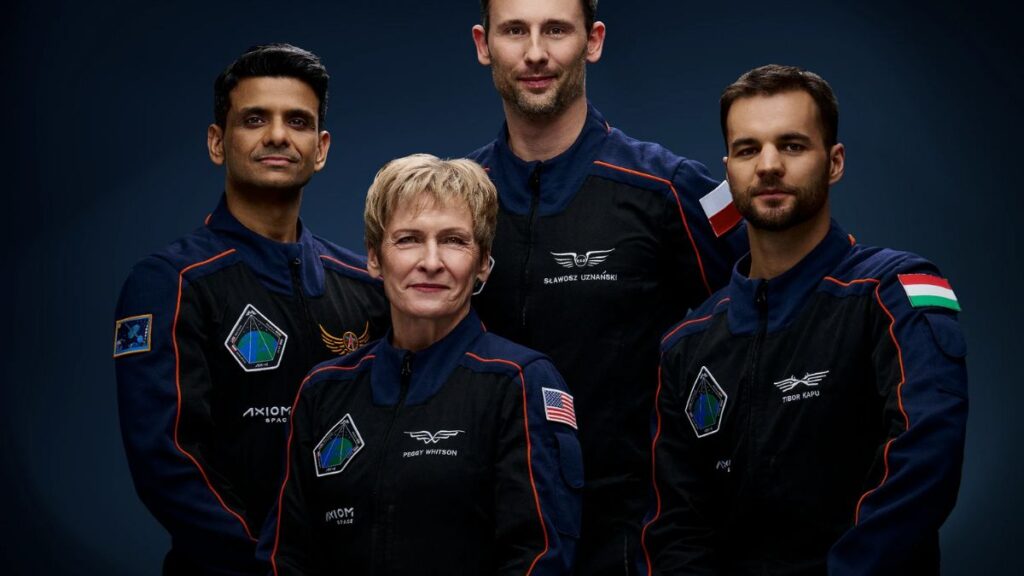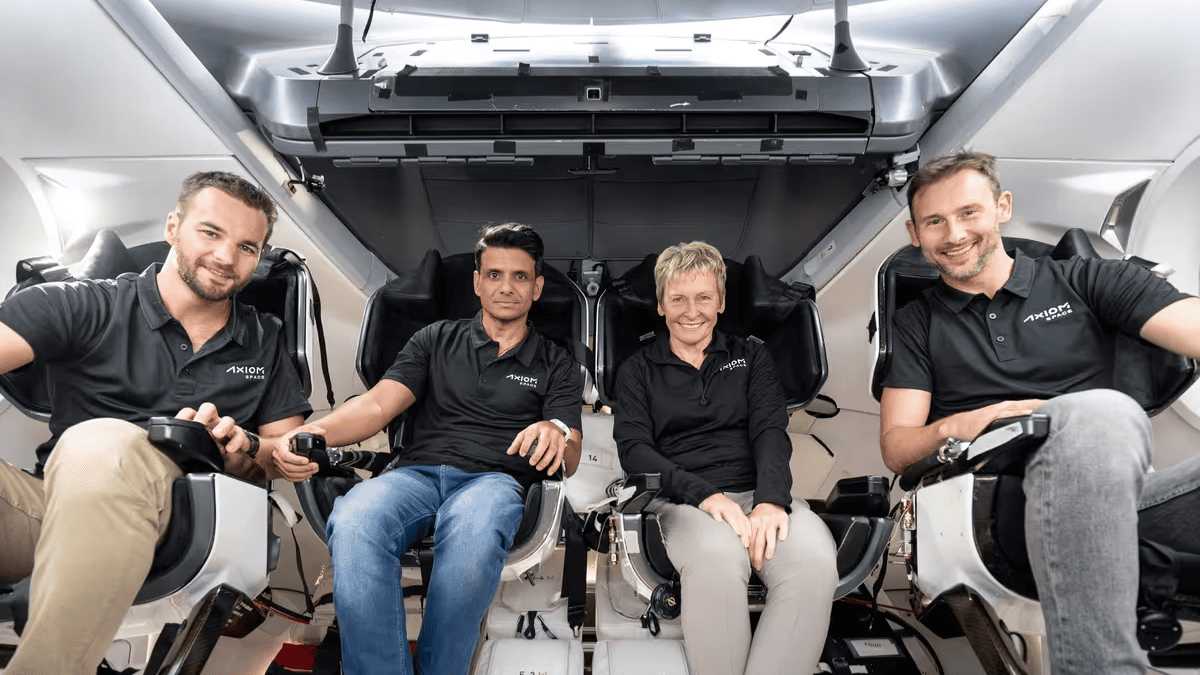The Axiom 4 (Ax-4) mission is a commercial spaceflight to the International Space Station (ISS) operated by Axiom Space. It is scheduled to launch on 11th June around 5:52 PM IST ( 12: 00 UTC ) by SpaceX Dragon Spacecraft from Launch Complex 39A Kennedy Space Centre. Shubhanshu Shukla, Gaganyatri from India, is this mission’s pilot.
The Ax 4 mission crew comprises four primary members: Commander Peggy Whitson, a veteran NASA astronaut and current Axiom Space representative; Pilot Group Captain Shubhanshu Shukla from the Indian Space Research Organisation (ISRO); and Mission Specialists Sławosz Uznański-Wiśniewski, a European Space Agency (ESA) project astronaut from Poland, and Tibor Kapu from Hungary. In addition, the designated backup crew includes Prasanth Balakrishnan Nair of ISRO serving as Mission Pilot, and Gyula Cserényi from Hungary as Mission Specialist.

| Mission Commander | Peggy Whitson (USA) |
| Mission Pilot | Shubhanshu Shukla (India) |
| Mission Specialists | Sławosz Uznański-Wiśniewski (Poland) |
| Mission Specialists | Tibor Kapu (Hungary) |
| Mission Pilot (Backup) | Prasanth Balakrishnan Nair |
| Mission Specialists (Backup) | Gyula Cserényi |
Axiom 4 Mission Research
The Ax-4 mission will support approximately 60 scientific experiments and research activities representing 31 countries, including the United States, India, Poland, Hungary, Saudi Arabia, Brazil, Nigeria, the United Arab Emirates, and several European nations. This marks the most extensive scientific agenda undertaken on an Axiom Space mission to the International Space Station (ISS) to date. The mission highlights the global significance and collaborative spirit of international partners working together to advance microgravity research and innovation in low-Earth orbit (LEO).
As part of the upcoming Axiom 4 mission, ISRO has shortlisted seven microgravity research experiments proposed by Indian Principal Investigators (PIs) from various national R&D laboratories and academic institutions. These experiments will be conducted aboard the International Space Station (ISS) in collaboration with ISRO’s Gaganyatri program. The selected studies span a wide range of disciplines, including human health, life and physical sciences, materials research, pharmaceutical development, and biotechnology. This initiative underscores the growing role of the Indian scientific community in leveraging the unique environment of microgravity to advance cutting-edge research with potential applications across multiple sectors.
List of Selected Experiments by ISRO in ISS:
- Impact of Microgravity Radiation on Edible Microalgae
- Institutions: International Centre for Genetic Engineering & Biotechnology (ICGEB) and National Institute of Plant Genome Research (NIPGR), under the Department of Biotechnology (DBT)
- Objective: To assess how microgravity and space radiation affect the growth and genetic activity of edible microalgae, exploring their potential as sustainable food sources for long-duration space missions.
2. Sprouting Salad Seeds in Space: Relevance to Crew Nutrition
- Institutions: University of Agricultural Sciences, Dharwad, and Indian Institute of Technology, Dharwad
- Objective: To investigate the germination and growth of salad seeds, such as mung and fenugreek, in microgravity, evaluating their nutritional viability for astronaut diets
3. Survival, Revival, Reproduction, and Transcriptome of the Eutardigrade Paramacrobiotus sp. BLR Strain in Space
- Institution: Indian Institute of Science (IISc)
- Objective: To study the resilience mechanisms of tardigrades in space, focusing on their survival, reproduction, and gene expression under microgravity conditions.
4. Effect of Metabolic Supplements on Muscle Regeneration under Microgravity
- Institution: Institute for Stem Cell Science and Regenerative Medicine (InStem), DBT
- Objective: To explore how metabolic supplements influence muscle regeneration in microgravity, aiming to develop countermeasures against muscle atrophy during spaceflight.
5. Analyzing Human Interaction with Electronic Displays in Microgravity
- Institution: Indian Institute of Science (IISc)
- Objective: To examine the cognitive and physical impacts of using electronic displays in microgravity, informing the design of user interfaces for space missions.
6. Impact of Microgravity on Growth and Yield Parameters in Food Crop Seeds
- Institution: Indian Institute of Space Science and Technology (IIST), Department of Space & College of Agriculture, Vellayani, Kerala Agricultural University
- Objective: To investigate how microgravity conditions influence the germination, growth, and yield characteristics of selected food crop seeds. The study aims to evaluate the feasibility of space-based agriculture by analyzing physiological and developmental changes in crops under spaceflight conditions.
7. Comparative Growth and Proteomic Responses of Cyanobacteria on Urea and Nitrate in Microgravity
- Institution: nternational Centre for Genetic Engineering & Biotechnology (ICGEB), Department of Biotechnology (DBT)
- Objective: To investigate the growth behavior and proteomic responses of cyanobacteria when cultured with urea and nitrate as nitrogen sources under microgravity conditions. This study aims to evaluate the adaptability of cyanobacteria in space environments and their potential role in life support systems, including oxygen generation, waste recycling, and bioremediation for long-duration space missions.
The Axiom 4 mission is scheduled to remain docked to the International Space Station (ISS) for up to 14 days, during which the crew will conduct approximately 60 research experiments and scientific activities. These include seven Indian microgravity experiments selected by ISRO.
The Axiom 4 (Ax-4) mission is a precursor to ISRO’s Gaganyaan mission, which is scheduled to launch in 2027, sending three Gaganyatris into space.
Meet Vyommitra: The AI-powered Humanoid Astronaut of India’s Gaganyaan Mission


